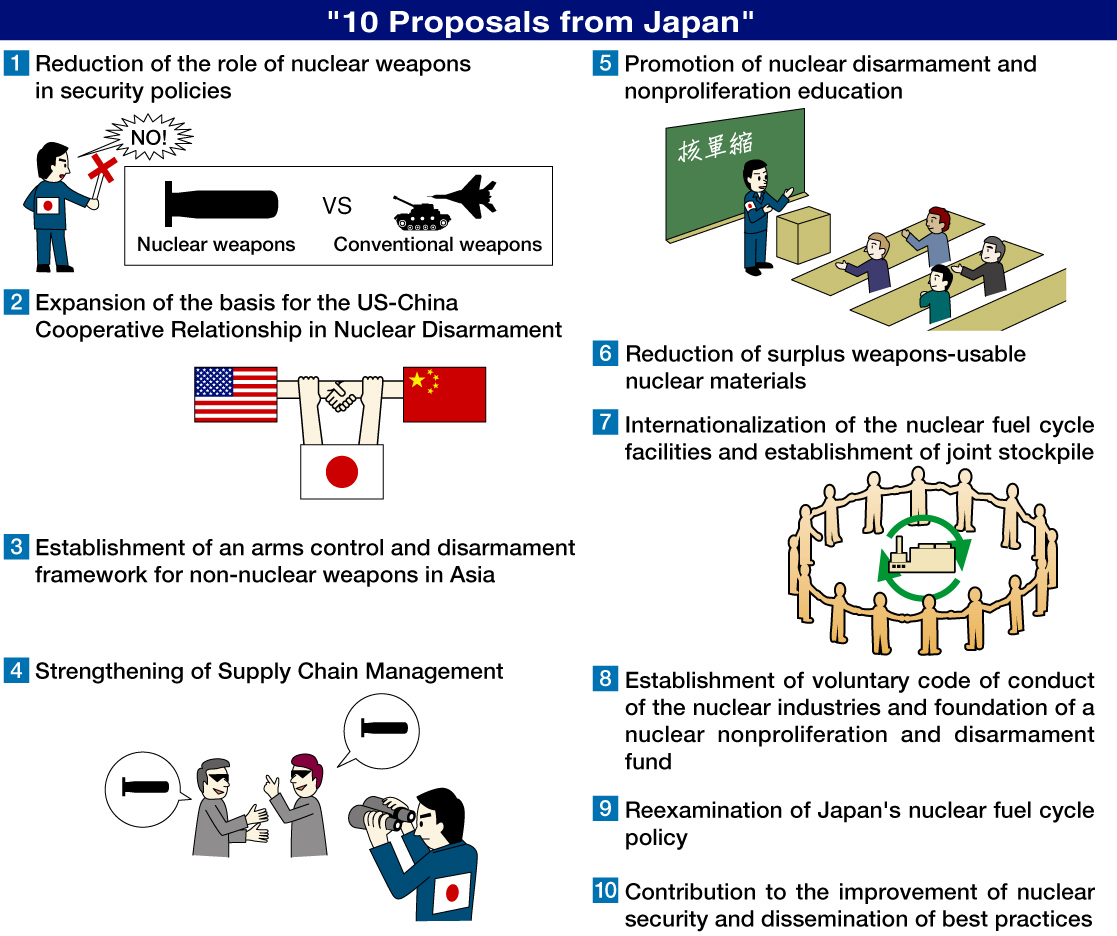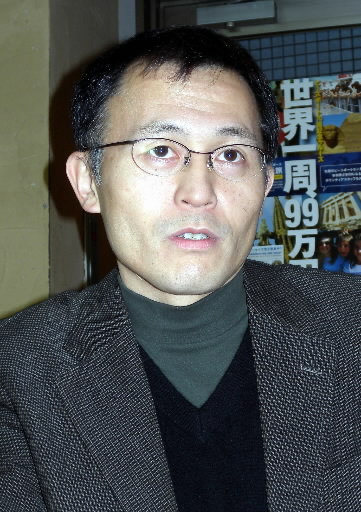Nuclear weapons can be eliminated: Special Series, Part 10
Jan. 30, 2010
Special Series: The Day the Nuclear Umbrella is Folded
Part 10: A-bombed nation's researchers make proposals for nuclear disarmament
by the "Nuclear Weapons Can Be Eliminated" Reporting Team
A-bomb survivors (hibakusha) have continued to call for a world without nuclear weapons to be realized as early as possible. At the same time, the A-bombed nation of Japan is charged with the moral responsibility of speaking out to the world about the inhuman aspects of nuclear arms. Now that 100 days have passed since the change of power in the Japanese government, the question is what concrete action the new administration will undertake in pursuit of the abolition of nuclear weapons. How can the administration resolve the dilemma of appealing for nuclear abolition while relying on the U.S. "nuclear umbrella" with regard to its national security? In the milestone 65th year since the atomic bombing, the A-bombed nation must speak out more forcefully.
At the end of 2009, a report entitled "Towards Nuclear Disarmament and Non-Proliferation: 10 Proposals from Japan" was completed. Nine researchers in Japan compiled this report. Ten concrete proposals concerning the role of nuclear weapon states and the nation of Japan are presented in Japanese and English on 54 pages.
The concept of "Mutual Assured Dependence" underlies these proposals. The concept aims at creating global security by fostering multilateral interdependence in all fields. Its acronym, MAD, strongly symbolizes the transformation from the old concept of MAD, Mutural Assured Destruction, an idea based on stabilizing the relationship between two nuclear rivals through the threat of mutual destruction in a nuclear exchange.
Exchanging views internationally
Tatsujiro Suzuki served as leader of the nine researchers. Mr. Suzuki is a visiting professor at the University of Tokyo and assumed the position as the vice chairman of the Japan Atomic Energy Commission early this year. Jayantha Dhanapala, president of the Pugwash Conferences on Science and World Affairs, suggested to him that "the A-bombed nation of Japan must speak out" in the same way that four former high-ranking U.S. government officials had contributed opinion pieces to the Wall Street Journal.
In January 2009, about 30 researchers from various nations including the United States, the United Kingdom, Australia and China gathered in Tokyo to share views on the creation of a nuclear-weapon-free Asia. Based on these discussions, the nine Japanese researchers continued to weigh the issue.
After writing a draft report in the fall of 2009, Mr. Suzuki and the other researchers traveled to the United States, Sweden and China to receive comments from such people as the members of the Pugwash Conferences. They received requests that "the proposals should be of a global scale rather than only focusing on Asia," and the discussions in Beijing included the topic of "threats from China." The report was then finalized, incorporating these aspects.
One of the aims of the report was to serve as a factor of influence on the Nuclear Posture Review (NPR), the basic guideline of U.S. nuclear strategy set to be issued soon, and the discussions of the International Commission on Nuclear Non-proliferation and Disarmament (ICNND), which issued its report at the end of 2009. The Japanese researchers presented their report to people engaged in both the NPR and the ICNND. In addition, they are poised to continue approaching policy makers in Japan.
"High expectations"
"Through compiling this report," Mr. Suzuki said, "we have felt keenly the high expectations placed upon Japan by the world." He stressed the importance of untangling the A-bombed nation's incongruous stance, which consists of appealing for the elimination of nuclear weapons and yet basing its security on the U.S. nuclear umbrella. "It is hard to gain the understanding of the world with this sort of logic," he said. "It is time that Japan's national security policy be objectively reviewed based on the voices of Hiroshima and Nagasaki."
However, thus far the Japanese government does not appear to have adopted any of the specific proposals recommended by the report. With regard to the ICNND report, as well, which the governments of Japan and Australia supported, it is not yet clear how the government of the A-bombed nation will use the report for the Review Conference of the Nuclear Non-proliferation Treaty (NPT) to be held this May. Hideo Suzuki, director of the Arms Control and Disarmament Division of the Ministry of Foreign Affairs, acknowledges that the government maintains a certain distance from such reports, saying, "These are not government drafts. They are in the same category as the Hiroshima-Nagasaki Protocol, which is advocated by Mayors for Peace."
Prime Minister Yukio Hatoyama's administration has clearly stated that "We will stand at the forefront for the abolition of nuclear weapons." However, the total amount allocated for nuclear disarmament and non-proliferation efforts in the budget for the new fiscal year made by his government is 10.32 billion yen, nearly identical to the 10.31 billion yen set by the former government in the last fiscal year. Despite the change of administration, the approach seems to be much the same.
Interview with Akira Kawasaki, executive committee member of Peace Boat: What should Japan convey to the world?
What should the A-bombed nation of Japan convey to the world and how? The Chugoku Shimbun interviewed Akira Kawasaki, executive committee member of Peace Boat, a Tokyo-based nongovernmental organization (NGO), who served as an NGO advisor to the International Commission on Nuclear Non-proliferation and Disarmament (ICNND). Below are Mr. Kawasaki's profile and his thoughts.
Akira Kawasaki
Mr. Kawasaki was born in Tokyo in 1968. He became a staff member of Peace Depot, a nonprofit organization (NPO) in the city of Yokohama, in 1998 and served as secretary-general from 2000. He assumed his current post with Peace Boat in 2003.
Resistance from the Japanese government
What surprised me at the ICNND meetings and during discussions with the ICNND commissioners was how much the Japanese government, as well as experts with positions similar to the government, are resisting the international movement seeking to accelerate the pace of nuclear disarmament, while, at the same time, officially appealing for the elimination of nuclear weapons.
In particular, their resistance to the measures to reduce the role of U.S. nuclear weapons is beyond belief. "The role of nuclear weapons cannot be reduced," one person said, "because of Japan's stance." I was also made keenly aware of the world's serious concern that "Japan may arm itself with nuclear weapons if the pace of nuclear disarmament increases."
Why is this so? It's because, unfortunately, a significant number of people have recognized the words not of Hiroshima and Nagasaki, but the words of some bureaucrats in the Ministry of Foreign Affairs and the Ministry of Defense as "the voice of Japan."
We need to reverse this situation through the power of our citizens. We must send a message which says: "This is the real voice of Japan."
Offer encouragement to President Obama
Concretely speaking, we have to express our support for limiting the role of nuclear arms and make efforts to reduce Japan's reliance on U.S. nuclear weapons. Despite resistance from the Japanese side, the ICNND included in its "short-term objectives" the phrase that the role of nuclear weapons should be limited to deterring only nuclear attacks. In the "medium-term objectives," too, the ICNND recommended that the nuclear weapon states adopt the policy of no-first-use of nuclear weapons.
The Obama administration has postponed submitting its "Nuclear Posture Review" to the U.S. Congress until March. The reason, I hear, is that the administration has been divided over the policy of no-first-use of nuclear weapons and the modernization of its nuclear arsenal.
Meanwhile, the Hatoyama administration has not yet presented Japan's nuclear policy. If, for instance, Mr. Hatoyama declared in a speech at the Diet that "We will support the policy of no-first-use of nuclear weapons and we believe that old nuclear weapons should be retired and dismantled," this would offer encouragement to the Obama administration to move in this direction.
The argument for nuclear deterrence theory is anachronistic
Limiting the role of nuclear weapons is nothing more than a step toward the goal of nuclear abolition. However, it could be a middle ground for joining hands with those who think that "nuclear weapons are still necessary at this point" and reluctantly accept the "nuclear umbrella," enabling them to think that "we can agree to that extent."
Now that the nations of the Asian economy have become so deeply interdependent, I cannot help but wonder why Japan continues to insist on perpetuating the nuclear deterrence theory that was adopted during the Cold War. With the practical judgment that permitting the presence of nuclear weapons is increasingly dangerous, the United States is pursuing "a world without nuclear weapons." Japan should announce its support for this intention not only in words, but in policy.
Leaving the nuclear umbrella means creating a new mechanism for disarmament and peace in Asia. Japan cannot achieve this goal alone. NGOs will seek to work together beyond borders and amplify the power of the messages being conveyed by citizens.
Key Words
Mutual Assured Destruction (MAD)
The condition in which adversary nations maintain the capacity to retaliate with an annihilating counterattack even in the event of a preemptive strike. During the Cold War, the United States and the Soviet Union used the notion of MAD to justify the nuclear arms race, contending that both sides would refrain from using nuclear weapons due to this fear of mutual destruction, thus deterring a nuclear war.
Nuclear Fuel Cycle
The process by which uranium and plutonium are extracted from reactors and reprocessed into new fuel for reuse. The first "pluthermal" nuclear energy project in Japan was launched at the Genkai Nuclear Power Station, owned by the Kyushu Electric Power Co., in Genkai Town, Saga Prefecture. The project, stemming from national policy, uses plutonium-uranium mixed oxide (MOX) fuel in conventional nuclear power stations with the aim of utilizing these resources effectively. However, the reduction in surplus plutonium has made little progress and the reprocessing plant in Rokkashomura in Aomori Prefecture has been plagued by problems.
(Originally published on January 24, 2010)
To comment on this article, please click the link below. Comments will be moderated and posted in a timely fashion. Comments may also appear in the Chugoku Shimbun newspaper.









